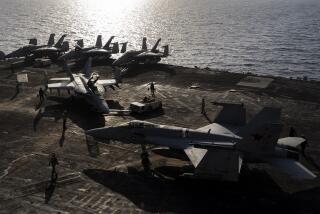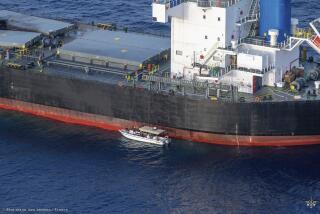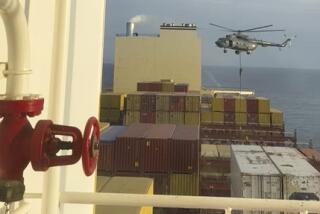Realistic Aim for U.S.: Halt Shipping War
- Share via
In the aftermath of the Iraqi attack on the United States frigate Stark, and with no other major act of belligerence seeming to spur such an about-face, the Reagan Administration has declared that Iran, not Iraq, is the major threat to shipping in the Persian Gulf.
With the policy to re-flag and escort Kuwaiti tankers, the Administration abandons all its previous wisdom about Iran’s geo-strategic importance--the rationale used to defend earlier weapons sales--and now takes a full leap into a policy that in effect pits the United States against Iran. Equally striking is the unnecessary show of force. The threat to shipping, although real, is not as dire as the Adminstration paints it, and should be met with diplomatic rather than military tactics.
Since the shipping war escalated in 1984, there has not been a significant drop in supply or an increase in price for Middle Eastern oil because of shipping attacks. Indeed, less than 1% of tankers operating in the gulf have been damaged. More important, there has been and continues to be an international glut in the oil market and in the oil-tanker market as well. During the course of the entire war Iraq has been the more effective at disrupting shipping in the gulf, attacking 219 ships compared with 95 for Iran. This history is underscored by insurance premiums for ships traveling to the area. Premiums for ships calling at Kuwait, targets of Iranian attacks, have indeed risen in the last year, to as much as 0.375% of a ship’s insured value. But these increases pale in comparison with the rates for ships calling at Kharg Island, the Iranian oil terminal, which are now as high as 15% of a ship’s value. This has forced the Iranians to operate their own tanker shuttle service, as well as to offer their own insurance program.
Although the Iranians have armed themselves to attack ships as never before, they have said repeatedly that they would agree to halt the gulf shipping war if Iraq would reciprocate. The Iranians have made many claims, some of them ludicrous, but there is good reason to believe that this is one on which they would follow through: Their total reliance on gulf shipping almost guarantees it. While the Iranians have maintained this position since the beginning of the war, the Iraqis have refused such overtures; their own outlets to the gulf were closed down early in the war, and they are able to maintain a substantial oil flow via pipelines. The economic hardships of the tanker war help keep Iran at bay, and the potential for the internationalization of the conflict is heightened--a possibility that Iraq, and Kuwait, would welcome. Given that Iraq is unlikely to win the war, a positive conclusion for the Iraqis might be provided by the entrance of the super-powers. But the United States should not be so easily drawn in.
To the extent that the Administration can exert influence on the Iraqis directly (especially in the aftermath of the Stark incident) and indirectly (through their Arab supporters), the United States should attempt to propel them and Iran toward a cessation of the war on shipping. Even though the Administration’s credibility with moderate Arabs is further strained by the Saudi missile-sale blunder, we should nevertheless press for this intermediate solution in the interests of everyone in the region.
The United States should be pressing the U.N. Security Council to call for a cease-fire in the shipping war. Instead, it proposes a cease-fire in the entire conflict, knowing this to be a position that Iran would reject. In that case the Reagan Administration intends to press for an arms embargo against the belligerents--a policy that would be impossible to realize in a world in which each country pursues its own economic interests.
Concentrating on solving the shipping war would serve the interests of the United States, our allies and the nations of the Persian Gulf area. It would be a policy that would promote the freedom of navigation, the Administration’s espoused concern, more comprehensively than would steaming around in the gulf protecting only the ships of Kuwait. It would prevent the possible spread of the conflict, lessen the potential need for American retaliation and preclude any Soviet role as a protector. Indeed, the moderate Arab states would welcome a steady, unobtrusive and well-reasoned U.S. policy that is supportive of their needs, as opposed to knee-jerk reactions involving a high-profile military presence. Finally, it would be a policy that would not further alienate Iran from the United States--a policy that the Reagan Administration considered so important just a short time ago.
DR, SKAUGE, Klassekampen, Oslo
More to Read
Sign up for Essential California
The most important California stories and recommendations in your inbox every morning.
You may occasionally receive promotional content from the Los Angeles Times.













